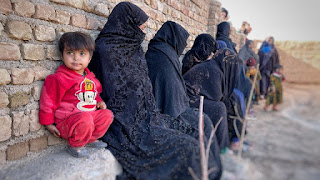Journalists Why…? Afghanistan Vs Taliban
 |
Days ago I watched the news where I heard this journalist giving a report about Afghanistan.
Just before videos of the Afghans were shown, my attention was drawn to the news report because of how the journalist told the story; I was eager to see the videos. In her news broadcast, she reported that the people in Afghanistan were in “abject poverty”, “at the brink of famine”, and that “there was almost no hope for them” amongst other harrowing languages that she used in describing the situation. One of the things she said that caught my attention was that Afghans were literally “selling their children just to be able to buy food”. This got me. And at this point, I felt very compassionate for the Afghans, “Oh poor Afghanistan” I said to myself. And above anything else, I wanted to see how desperate the situation was that they were literally selling their children to feed.
The next minute, a live video of Afghanistan was shown. The clip showed the snowing city, and women wrapped in hijabs with their children in their arms were standing with their barefoot on the extremely freezing iced floor.
In the same video, there was another scene with a woman sitting on the floor, her four children laid down in a lined format in front of her, and she was apparently begging for alms. It also showed the video of a man with his daughter, and according to the news report this man was an intellectual—a teacher; the reporters asked him if he’d sell his child and he dolefully replied: “why would I be happy to keep my child when I don’t have the resources to take care of her?” As it seems, this man is being owed his wages as a teacher, and from his response in that clip, he seemed more concerned about being paid his wages than actually selling his daughter.
 |
| Photo credit: Aljazeera.com |
Now, at the initial phase of the news broadcast, before the videos were shown, the news reporter created a scenery in my head, where crowds of Afghans were literally throwing their children out to others (as though they were a commodity) just to get money for survival. But after watching the live videos, I had a clearer picture of the situation, perhaps not entirely clear, but definitely more candid than the picture painted by the reporter.
I think that this sensationalised style of reporting has done more harm than good to many parts of the world, especially the irrecoverable damage it has done to the word “AFRICA” by creating narratives that are difficult to undo.
There might be more context to this story but my point clearly is: Isn’t it high time we changed this tabloid journalism? Haven’t people had enough compassion fatigue already?
This is a call to all journalists, news reporters, storytellers, and writers—resist the temptation to exaggerate or over sensationalise the story you’re telling.
It is more dignifying to say it as you saw it, and as it truly is. Or better still, give the people the audience to tell their own story! Because it matters who tells the story!

Sofia K.
Dear Progress, your article is very interesting, thank you for posting it. I work for a not-for-profit in the UAE and we will be happy to work with you on a particular project that we are doing. If you could kindly send me your email on sofia.khan@dignifiedstorytelling.com, I will be happy to share more details. Many thanks.